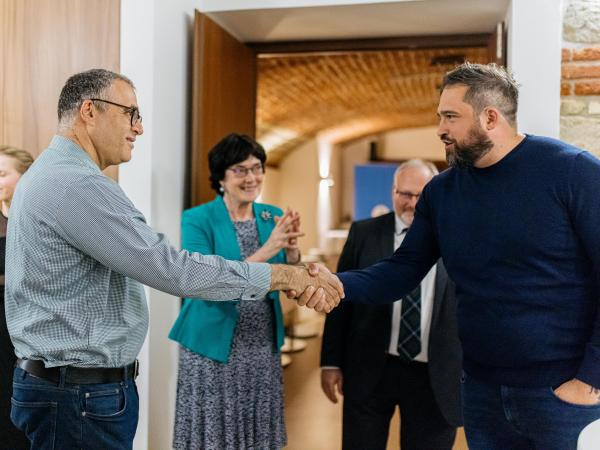
Session 1: Thinking Through Transition(s)
The post-1989 liberal cycle seems exhausted. In Central Europe, it represented a triple transition: democracy, the market economy, and Europe. These three objectives were attained, but all three are now in crisis. Democracy faces the populist wave; the market economy has been confronted since 2008 with a global crisis; and Europe is divided within while being challenged in its own neighborhood. This draws to a close the post-1989 liberal cycle, but perhaps also the longer cycle associated with the Enlightenment, which is now more than two-hundred years old.
To have a better understanding of the long-durée ramifications of cultural changes in modern history it takes a comparative analysis of the historical and sociological developments that have shaped the cultures of ethno-religious groups from the early modern corporation, through the imperial centralizing administrations, to the one-nation modern state. What has survived of the pre interwar period multicultural makeup of European and Mediterranean societies after the collapse of the post WW2 political system? Were 'national' cultures of ethno-religious minorities that have developed in imperial multi-ethnic environments 'invented' by intellectuals, or spontaneously emerged within the early-modern corporative societies? Could one speak of any given 'pure' culture, or claim 'authenticity' having in mind inter-ethnic cultural exchange, hybridity, or ambivalent identities? Is the term "culture" still relevant for understanding the specific features of any given minority within contemporary nation-states?
Similarly, the rapid development of technology and its impact on our daily lives seems to bring a number of the foundational pillars of our legal systems to a point of exhaustion as technological developments – from advancements in standard legal tasks to big data analytics – are all taking center stage. Nonetheless, the way we think about the world, construct our legal and political tools have changed little in the last thirty years. This roundtable looks into how states and their legal system manage through historical transitions and / or paradigm shifts which new technologies has brought along.
Moderator:
Petr Agha (Institute of State and Law of the CAS)
Speakers:
Guy Miron (History, IASH)
The Imperial Turn and the age of possibilities - Reexamining the Habsburg model from a comparative perspective
Daniel Friedmann (Law, IASH) Multiculturalism in the legal system
Zdeněk Sloboda (Institute of Sociology of the CAS) Transitions and ambivalences of the Czech LGBTIQ+ movement
Session 2: Is The Nation-State Still A Thing?
Territory is not just the legal space wherein society is organized by public authorities. It is also a political space. Within this arena, electoral competition unfolds between parties and movements that aspire to represent citizens in governing bodies. However latest developments call into question the importance of the nation-state as an overarching concept.
Territory also espouses the notion of national community, which embodies popular sovereignty and in which democracy, the legitimacy of governments, and state sovereignty are firmly rooted. This roundtable amongst other topics investigates the central role of the nation-state by examining the two main factors: on the one hand, national identity, which has been shaped by the nation-state and the legacy of the prices of secularization and on the other hand the post-national process that currently seem to be superseding the concept of the nation-state.
Moderator:
Petr Agha (Institute of State and Law of the CAS)
Speakers:
Nili Cohen (Law, IASH) The mixed identities of Franz Kafka
Alžběta Krausová (Institute of State and Law of the CAS) Impact of Information Technologies and Technological Giants on Nation States
Gur Alroey (History, IASH) National State and the challenge of refugees and migration
Session 3: The End of History: On the Exhaustion of Political Ideas
Historical facts are analytically observable but they are not in themselves facts, they are contextual (drawing meaning from the circumstances in which they arise) and relational (depending on the interpretive lens they are viewed through), and ultimately constructed through
narratives. ‘Ideas matter’: different positions on causes of - and solutions to - structural problems give rise to contestations over what constitutes the foundational ideas and how do we use them. Time and again, today, the words ‘democracy’ or ‘rule of law’ are heard in association with the word ‘crisis’. Or should we rather consider such ideas as having outlived the socio- economic conditions that gave rise to their existence? In this way, we might be able to raise some important questions about the nature of the current political ideas, principally: its relationship to socio- economic determinants. The roundtable considers three fundamental areas: (a) the key concepts that underpin the wider project of liberal democracy; (b) the critique constitutionalism and how this concept renders the construction of liberal democracy; and, (c) the ideological response to constitutionalism. On this basis, the roundtable engages in a discussion of the most plausible explanation for what we most commonly describe as ‘crisis’ and the most likely avenues of the post-crisis world.
Moderator:
Petr Agha (Institute of State and Law of the CAS)
Speakers:
Yitzhak Englard (Law, IASH) Democracy and Judaism in Israel
Michael Hauser (Institute of Philosophy of the CAS) Frames of Political Ideas: From Liberalism to Democracy
Petr Drulák (Institute of International Relations Prague) The Road to a Peripheral Oligarchy
